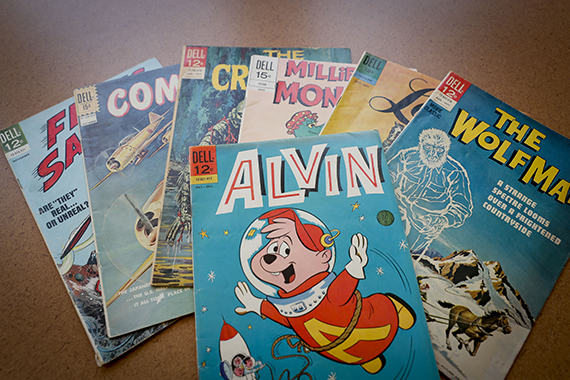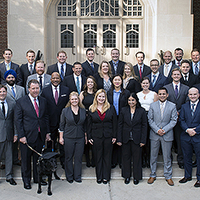 In addition to publishing an academic paper on “The Importance of Superheroes to the American Comic Book Industry,” alumnus David Palmer has brought his love for the genre into the classroom through a capstone course at the University of Nebraska at Kearney. (Photo provided)
In addition to publishing an academic paper on “The Importance of Superheroes to the American Comic Book Industry,” alumnus David Palmer has brought his love for the genre into the classroom through a capstone course at the University of Nebraska at Kearney. (Photo provided)
Funny Business
David Palmer examines comic book industry from a management perspective
Like a typical doctoral student, David Palmer (PhD ’97) devoted most of his time at Purdue’s Krannert School to research and teaching. If you couldn’t find him in his office or the classroom, however, the next best place to look would likely have been Von’s Comics on Chauncey Hill.
A collector for more than 50 years, Palmer has amassed some 20,000 comic books tucked away in 72 cardboard storage baskets with title characters ranging from Captain America and Thor to the Incredible Hulk and Spider-Man.
“Comic books are fun and full of fantasy,” Palmer says. “Until just recently, comic books were the only place a man could fly. Now with special effects, you can do anything. Comic books had a corner of that market.”
Now a management professor at the University of Nebraska at Kearney (UNK), Palmer never imagined that his love for reading comic books would evolve into a passion for examining the industry from a business perspective.
Unsure of what he wanted to study, Palmer dropped out of college to work in the food service industry, which eventually led him back to school. “I didn’t know what I wanted to be,” he says. “My experience in restaurant management solidified my desire to study business.”
After earning a BS in management science from State University of New York University Center at Binghamton, and later a MBA from Bowling Green State University, Palmer moved to Iowa to manage dietary departments for hospitals and retirement centers for Marriott. He also began teaching at a community college and discovered his second passion — teaching.
Palmer joined the faculty of UNK in 1997 after completing his PhD in organizational behavior and human resource management at Purdue. Although he has published papers on numerous topics, Palmer’s interest in comic books never waned. His primary research focus is on how the industry has changed over time.
It began in the 1930s, when immigrants and other marginalized individuals who couldn’t get jobs in publishing due to discrimination became the first to create comic books, Palmer says. With the introduction of Superman in 1938, the business was soon booming.
“Comic books were selling by the millions, maybe upwards of billions,” Palmer says. “It was a huge industry, and it just grew through the 1940s when they were mass-marketed through newsstands and locally owned mom and pop shops.”
The comic book industry began to decline in the 1950s when the television became a fixture in Americans’ living rooms. A nationwide anti-comics movement also arose at this time, with parents’ concerns about the graphic depiction of violence and sex in comic books eventually leading to censorship.






